Marcia Thornton Jones's Blog, page 52
March 11, 2022
The Eternal Optimist

Of course, we were to read Voltaire’s satire in the original French. Not easy. But even through my struggles, I do remember liking it. Identifying with it, even. Or maybe just sitting there in awe of of Candide’s perseverance because even through setback after disaster after misfortune – spoiler alert! – Candide retains his optimism and lives happily ever after.
(Note to self: reread Candide to see how Voltaire pulled that off.)
I may not be as staunch an optimist as Candide – I doubt anyone is – but I do try to find at least one spark of brightness even the face of the worst situations. Not always easy, but still.
Creatively, though, there is a downside to having such a happily-ever-after attitude. I struggle to put my characters in the tough situations necessary to create a satisfying story.
Taking a lesson from Candide and ALL his trials, though, just may give me the fortitude to go deeper and darker with the fictional people I've come to love. Having them struggle harder, learning more, growing faster could be the key to an even better happily ever after.
Jody Feldman, author of The Gollywhopper Games series (middle grade) and forthcoming YA thriller No Way Home (Sourcebooks; August 2, 2022) is working overtime to get poor Eddie, the main character in her MG work-in-progress, into even more dire situations.
March 10, 2022
The Circus at the End of the Sea
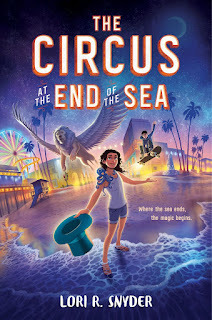
I thought it would be fun to interview Lori Snyder, the author of this fantastic book.
1. What was your favorite thing about writing The Circus at the End of the Sea ?
There were two parts: first, that I got to write a love letter to this place that is so much a part of me (Venice, CA); and next, that I decided not to write anything in this book that didn't delight me, and that was so helpful and fun!
2. Ophelia the octopus nearly steals the show in this book. How were you able to give such life and personality to an octopus? Did you have to do a lot of octopus research to create her?
Well, as a former marine biologist, the octopus is my favorite invertebrate and I think they already have a ton of life and personality...so it wasn't that hard! I did a tiny bit of research but was already so in love with octopuses and their brilliance that it wasn't too much. (As a note, I am not a fan of research. I think it's one of the reasons I write fantasy, because I just get to make everything up...) Ophelia was so much fun to write, especially once I decided she would be a mimic octopus (which really exists), but one with a magic twist who can mimic pretty much anything.
3. You're a yoga teacher of many years. There are yoga themes throughout the book. Can you tell us more about how you incorporated these into a middle grade fantasy novel?
For me, how we accept and sit with the complexity and realities of life, allow ourselves to grow and change without grasping for the changes we want and rejecting the changes we don't, and encourage joy, are things I think about a lot. I also think a lot about the tendency in our culture to live in duality, to put things into categories of this or that rather than recognize the world as complex, as both or all or neither or somewhere in the middle. Hardly anything exists as a duality—maybe nothing does, but I'm not prepared to make that assertion without some study of it—and in fact, it's us as humans who make that all up! We make up those categories and then try to shove ourselves, others, the world, and everything into one or the other. It's such a dehumanizing and constricting way to live and think...and yet many conventional story structures are based on this sense of duality as well, particularly in fantasies. I wanted to write a story that was more in line how I see the world. A fantasy without a villain. A story where terrible things don't, actually, keep happening to the main character: magic is what keeps happening to her...and yet, there's still a story. A story that looks at how we move away from duality and into the fuller experience of being alive, into seeing the true nature of things with more skill. All this is woven through The Circus at the End of the Sea, and I hope I did these thoughts justice.
4. Many of the blog's readers are teachers. Can you speak about how your experience as a fourth grade teacher might have informed your work?
Oh man, do I love this age group! I think my teaching experience, both in the classroom and also on a boat for several years, taking kids out into the Pacific to see blue sharks, sea lions, and kelp forests, just helped to remind me of the vast capacity for wonder, goofiness, and brilliance we all have, and to allow all of that in with equal measure when I write, as much as I can manage.
5. I know you're working on a new novel for your editor, because I've gotten to read some. And it's equally as fantastic as your first! How are you able to maintain such creativity while working on a deadline?
Um...the answers are: 1. Miss the deadlines a lot, and 2. I don't (hence answer #1). I sincerely hope that if you ask me this question for my third book, which I haven't started yet, my answer will be: oh, it's so easy! Honestly, though, mostly I'm just amazed that after all this time of trying to get published, now I'm on deadline for a second book!!! That is just the best!
6. You do all kinds of amazing free workshops, meditations, and writing exercises for writers through The Writers' Happiness Movement. You give writers tips and tricks to maintain creativity and calm during difficult times. What one piece of advice can you give to folks struggling to be creative right now?
The first thing that comes to mind is this: it's okay if you aren't creative right now. Don't worry. It will come back, I promise. If you're struggling with creativity, maybe just let whatever you do right now be as healing for you if possible. If this is writing, great—any kind of writing, by the way, whatever calls to you. It all matters. But maybe your creativity wants to come out in another way right now. Maybe you paint rocks, or bake, or call up your niece and tell her bedtime stories. I think it's really time for all of us—and this is to remind myself, too—to decouple the idea of creativity from the idea of productivity. Sometimes, creating is exactly what we need. Other times, we really just need to take a nap or hang out with a friend—all of which will inform our creativity at another time, when we're ready. We are all part of changing our systems right now, of birthing new ways of being, and I think reclaiming our own humanity and worth, regardless of what we do or don't produce, is vital.
To learn more about Lori Snyder and her book, visit her at https://lorirsnyderauthor.com/
March 8, 2022
LONGING FOR SNOW -- by Jane Kelley
My part of Wisconsin hasn't gotten much snow this winter. This is a hardship for people who love to ski and for people who make their living off of people who love to ski. I don't fall into either of those categories. But I have been longing for snow.
After the leaves have fallen, the landscape turns brown. Intellectually I know that the roots are alive and when spring comes there will be plenty of green. But the dead stalks are sad reminders that nothing is growing now. In fact, there is a lot of death.
Then the snow falls. And my view is transformed.
Winter wonderlands are beautiful. But the blanket of snow does more than outline each delicate branch. It hushes the world.

In winter, those waves are under layers of snow and ice. There is quiet. Momentarily I feel at peace.
The blanket of snow hasn't really changed anything except what I see on the surface. The jagged edges are still there. Even the waves still churn -- just farther away.
Sometimes that blank white space is just what I need.
And then, there will be new beginnings. A few tracks lead me to something new.

Hmmm, I wonder. Who walked here? And what happened when their paths crossed?
Jane Kelley is the author of many middle grade novels, none of which are set in the winter. Yet.
March 4, 2022
A Time For Us...
By Charlotte Bennardo
As the song from Romeo and Juliet goes: A time for us, some day will be...
A time to do what I want- like a SNOW DAY!

Photo by Kristin Vogt from Pexels
I have a select group of things I love to do on a snow day. When my kids were younger, it included making snowmen, sledding down a hill, then coming in, wet and cold for hot chocolate and a movie. Then there would be baking together as a family. Keeping the boys busy and out of trouble was the main focus of the day.
Now the kids are grown and doing their own things. Instead of playing in the snow, I take a walk, listening to the susurration of the snow falling (I'm excited I got to use that word!), snuggling on the couch with the cat, a good book, and tea, and then later baking something with whomever is awake and willing. Now the time is more personal and I do what I want. I usually have several ideas and manuscripts that need working on so I don't lack for things to do, although that time may be challenged again because my husband retired and it always seems to us writers that just as you're sitting down to bang out hundreds or thousands of words, someone wants your attention.
While I love the new softer routine of a snow day, I'm hoping there are no more this year. With warmer weather, although I have more chores like taking care of my gardens, washing winter off the patio furniture and the windows (I've got a LOT of windows), and such, everyone is so glad for the warm weather they go off and do warm weather things leaving me at home alone. Ahhh, golden time for a writer. I sit on my patio and write. I can draft a whole novel from start to finish in just over a month. Snow day or sun day, as an author, I sneak in writing no matter what. The other things, like enjoying the comfort of my home or my backyard, are shared between what I want and what the family wants.
So if a snow day comes, I'll enjoy it (especially since I don't have to shovel it!). Hope you enjoy yours!
Charlotte writes MG, YA, NA, and adult novels in sci fi, fantasy, contemporary, and paranormal genres. She is the author of the middle grade Evolution Revolution trilogy, Simple Machines, Simple Plans, and Simple Lessons. She co-authored the YA novels Blonde OPS, Sirenz, and Sirenz Back in Fashion. She has two short stories in the Beware the Little White Rabbit (Alice through the Wormhole) and Scare Me to Sleep (Faces in the Wood) anthologies. Currently she is working on several novels for both children and adults. She lives in NJ with her family, two demanding cats, and a crazy squirrel couple who just moved into her backyard oak tree.
March 3, 2022
This Poet's Ideal (Snow) Day
Hello, Irene Latham here! I live in a state (Alabama) where snow doesn't come all that often...and when it does, EVERYTHING shuts down. It's kind of wonderful. :)

Now that our children are grown, snow days are...quieter! Here's how I like to spend mine:
waking up, rushing to the windows
taking/sharing pictures
quick breakfast
back in bed to write for a while
bundle up, head out in the snow for snow angels, snow man, etc. (depending on type and amount of snow) and always always more pictures
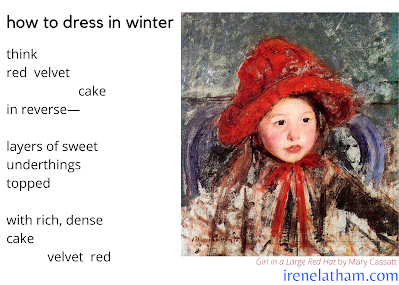
snow cream! (in your favorite mug or bowl, mix snow + milk + vanilla flavoring. Yum!)
back in bed to read
up for lunch
meditation/short nap (yep, back in bed! I love my bed! :)
walk outside with Paul and Rosie (if it's safe/not too slippery)
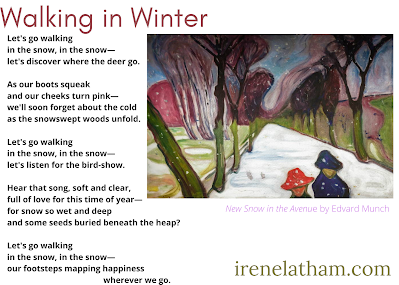
writing a couple hours at my desk (maybe...maybe back in bed!)
cello practice (something like this)
art project (currently I'm obsessed with papercutting!)
whatever-we-got soup for supper (makes for some interesting flavors!)
movie/Netflix with Paul (currently All Creatures Great and Small)
more reading before bed
dream of snow!
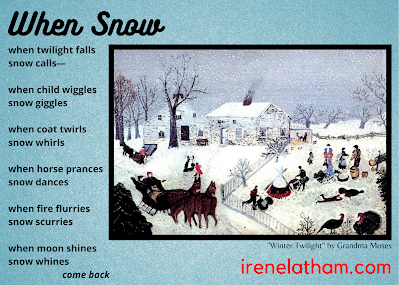
For more snow (and other weather) poems, visit my ArtSpeak: Four Seasons gallery! Thanks so much for reading.
March 2, 2022
Reading about Ukraine
Reading about Ukraine
Our blog’s themes for March are optimism, forward-thinking, and passion. It seems difficult in recent days to muster any optimism. The past week has seen horrific images of a democratic country under attack by a dictator. A military convoy miles long travels down the road toward Kyiv; Kharkiv is surrounded, with heavy loss of life. Thinking forward, it’s hard to imagine that Russia’s brutality will end any time soon. But passion…that’s something we’re seeing every day, as Ukrainians make Molotov cocktails, sign up to fight, and display courage under extreme pressure.
One middle grade author who’s written frequently about Ukraine and its history is Marsha Forchuk Skrypuch. A Ukrainian-Canadian author, Skrypuch’s books include a series of historical novels about two Ukrainian sisters, Krystia and Maria. The first two novels, Don’t Tell the Nazis and Trapped in Hitler’s Web, focus on the girls’ experiences during World War II.
The most recent, Traitors Among Us, was published last year. It focuses on what happens to the sisters when they are imprisoned by the Soviets after the war. In an interview I did with her last September about the novel, Skrypuch said:
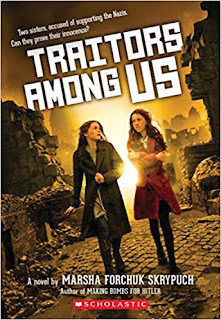
“From my research, I realized that refugees like Krystia and Maria were far from safe at the end of the war, even though they had been given asylum in an American refugee camp.
Thousands of survivors just like them ended up being kidnapped right out of Allied refugee camps and taken into the Soviet Zone, where they were interrogated and tortured into signing false confessions, and then held in secret compounds called ‘silence camps.’
I wanted to know how Maria and Krystia would cope if this happened to them. I especially wanted to know how they would (or if they could) escape. There were 10,000 young people who had the experience that they did after the war and I wanted to shed light on it.”
Asked what she hoped readers would take away from the book, she said: “History as we know it only scratches the surface of all that has happened in the past. There’s so much that we don’t know and what we don’t remember and learn from, we’re bound to repeat.”
At a time like this, these books are important reading.
--Deborah Kalb
@font-face {font-family:"Cambria Math"; panose-1:2 4 5 3 5 4 6 3 2 4; mso-font-charset:0; mso-generic-font-family:roman; mso-font-pitch:variable; mso-font-signature:3 0 0 0 1 0;}@font-face {font-family:Calibri; panose-1:2 15 5 2 2 2 4 3 2 4; mso-font-charset:0; mso-generic-font-family:swiss; mso-font-pitch:variable; mso-font-signature:-536859905 -1073732485 9 0 511 0;}p.MsoNormal, li.MsoNormal, div.MsoNormal {mso-style-unhide:no; mso-style-qformat:yes; mso-style-parent:""; margin:0in; mso-pagination:widow-orphan; font-size:16.0pt; font-family:"Times New Roman",serif; mso-fareast-font-family:Calibri; mso-fareast-theme-font:minor-latin;}.MsoChpDefault {mso-style-type:export-only; mso-default-props:yes; font-size:16.0pt; mso-ansi-font-size:16.0pt; mso-bidi-font-size:16.0pt; mso-fareast-font-family:Calibri; mso-fareast-theme-font:minor-latin;}div.WordSection1 {page:WordSection1;}
February 27, 2022
My Mama Didn't Raise No Protagonist
The first book I ever sold, Brand-New Emily, started out with a very different kind of heroine. Hindsight, as they say, is 20/20, so I now realize that the first version of my character Emily was frightened, weak, and far less interesting.
I learned this when a big-time agent requested a look at the manuscript, only to respond with a nonchalant, "I prefer a feistier protagonist" when he passed on representing me. It took me a while to understand what he meant.
Based on his comment, I changed Emily to be much more in charge of her own destiny, which made her a much more interesting character. It also made her disobey her dad, tell some "little white lies," and even be downright cruel at times. After all, protagonists have to want something and want it badly--even if it means breaking some rules in order to get it. Why hadn't I thought of this in the first place?
I blame my parents. 😜
It didn't occur to me at first to make Emily do these kinds of things because I was following the old "write what you know" advice, and when I was Emily's age, I feared the wrath of my mom and dad. Actually, I didn't fear their wrath so much as I feared their disappointment. I was a pleaser. As you can imagine, this made me extremely popular in junior high in addition to later affecting my career as an author!
Now when I write, I go for protagonists who won't give up...who will do whatever it takes to meet their goals. And I save the pleaser kids for moral conscience supporting characters.
"Well-behaved women seldom make history," as the saying goes. And well-behaved children seldom make feisty protagonists.
Ginger Rue's current book, Wonder Women of Science, is co-authored with rocket scientist Tiera Fletcher, who is currently working with NASA on the Mars mission. The book profiles a dozen amazing women (besides Tiera!) who are blazing new trails in their respective STEM fields.
February 26, 2022
Twisting Cliches to Make Them Unique (Guest Post by Sunayna Prasad)
When writing their stories, authors must perform research to ensure that their content is factual and believable. While audiences might accept certain tropes, regardless of how often they are used, some find their use overdone and consider them to be clichés, which leads to dissatisfaction. While I performed research on the fantasy story I was writing, I discovered the many common tropes and character types that displease much of the audience of that genre, for example dragons, elves, and orcs.
Of course, authors using cliches such as these can still be successful. Audiences have different tastes, no matter what genre they most enjoy. Some may favor these character types, while others may be tired of them. What this means is that when a writer performs research on their topic, they should know their audience as well as possible.
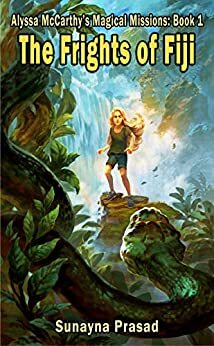
In the earlier days of writing the first installment of my book series, I did a lot of research on how to write fantasy for children, who are my audience. Not only did I learn what tropes people consider to be overdone, but I also brainstormed an idea to give my content and characters a twist—create my own magical creatures.
Although my stories are mainly set in modern-day America, a large portion of the first novel in the series takes place on a made-up enchanted island in Fiji. Because Fiji is relatively near Australia, many of the fantastical animals were inspired by Australian wildlife. For example, one creature in my novel is a fusion of a rainbow lorikeet and a kangaroo, while another is a dingo that can change colors. Through such worldbuilding, I could build more original ideas or change clichés into original ideas.
Despite the fact that I wanted to avoid or change cliches, there was one trope in the second installment of the series that was originally a stereotypical antagonist—a skeleton. In my early drafts, I depicted him as a purely wicked being who carries a scythe. However, as I learned more about developing characters, such as giving good and bad traits to both the protagonists and antagonists, my portrayal of the skeleton changed. He is now a depressed character who loathes his appearance and wants to be human; however, because nobody understands him, people fear him.
The strategy of twisting clichés not only applies to fantasy; it can work with any genre. For example, suppose you are writing a book about a girl attending a new school who is picked on by the popular crew. Instead of making the popular girls stereotypical, they could be given physical flaws so that they are not perfectly beautiful. Another idea could be to make something embarrassing happen to them.
Whatever genre you write in or audience you target, remember to research everything necessary for your topic and premise. If you find that you are using tropes that your potential readers are sick of, you can give them a twist. Just remember to show your story to an editor and listen to their feedback on whether the approach works for your story.
~
Keep up with Sunayna, subscribe to her newsletter, or learn more about her books at her author site.
February 23, 2022
In Ten Distracted Minutes a World Begins: Smack Dab in the Imagination by Dia Calhoun
What if the creation myth had gone like this:
And Whatever-You-Call-God said:
I’ve got to get that universe made. What a big project. I’m too tired today. It’s got to be perfect. Maybe a third cup of coffee, maybe I’ll put it off until I’m more rested tomorrow…
If you wait to write until you have the perfect room, the perfect golden hour, idea, state-of-mind, energy, rest, you will wait forever. Bringing your “whole self” to your creative work doesn’t mean bring your perfect self.
Your "whole self" is your most human self—tired, cranky, and distracted, when you're try to snatch a moment to write while the cat is crying, the phone is beeping, the neighbor’s infernal leaf-mower is blowing, blowing, blowing. That’s the place, one of them, anyway, that is real. The best writing is about the cracks in the mirror, the smudges on the eyeglasses, the burnt roast, the lost ticket—all the vulnerable moments of human life. Why not write from there if that's what you have?
Don’t wait for the perfect moment. Obviously, Whatever-You-Call-Goddidn’t. You’ve probably noticed lately that the universe is far from perfect. But would you rather it hadn’t been made at all? Not me. I’ll take daffodils, even if they sometimes bloom too early and get zapped by late frost.
So, what are you waiting for? Go ahead. Take ten exhausted, distracted minutes and write something down. The world starts with mud.
February 16, 2022
Lonely Girls Solving Mysteries
Ah, who doesn't love this trope? What good would it be for a girl in a book to be surrounded by a supportive family and helpful friends? Sure, you have your March sisters, the Penderwicks, the Wright 3, and the Three Rancheros - supportive groups all - but people love to root for the lonely child, who perseveres against her loneliness and, in the process, makes life better for everyone.
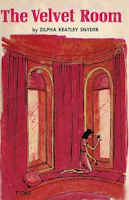
One of my favorite childhood books features such a girl. Robin, the heroine of Zilpha Keatley Snider's "The Velvet Room," first published in 1965, likes to wander off on her own. Her two capable brothers, movie-star obsessed older sister, and clingy, sickly younger sister aren't very agreeable companions. Plus, it's the Great Depression, and her family is traveling in their car looking for work. Opportunities to be alone are few and far between. When they finally settle into a modest house while doing work for a California apricot farm, Robin takes every opportunity to sneak off and be by herself. While wandering, she finds an abandoned mansion and meets a witch-like old woman who lives in the cottage behind it. Her wandering now has a purpose, and soon, she discovers there is a mystery to do with the old house - and the old woman. As a girl, I felt a kinship with dreamy Robin and her secret hideaway tower room.
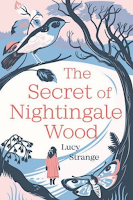
Just recently, I read a book that reminded me of The Velvet Room, if not precisely in plot, then in atmosphere and feeling. The Secret of Nightingale Wood, by Lucy Strange, takes place in England between the two World Wars, and follows Henrietta, known as Henry, as she traipses about the woods of her new home. There has been a family tragedy; mother is ill, father is working abroad, and it's just Henry, Nanny Jane, and her baby sister, nicknamed Piglet. But there is a sinister plot afoot - an ambitious doctor wants to have Henry's mother committed to a sanitarium so he can try out an experimental treatment, and there is some mystery as to the fate of the home's previous owner. Henry has no one to rely on but herself and, like Robin in The Velvet Room, a witch-like lady who lives in an old caravan in the woods.
Both girls are forced to be more brave, bold and self-confident than they ever thought they could. They discover wells of strength in themselves that enable them to do hard things. And do they both succeed? I shouldn't give it away, but what good is a middle grade book without a happily ever after? Both Robin and Henry reap benefits for their entire family with their courageous actions. Besides, knowing the outcome doesn't take away from the intricacies and enjoyment of the journey.
There truly is nothing new under the sun when it comes to books, and yet even familiar tropes can be enjoyable in the hands of a skilled storyteller.



